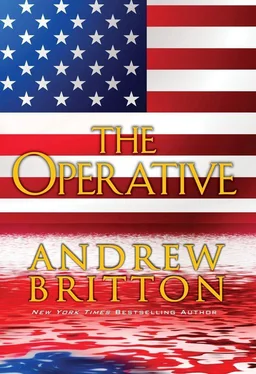Andrew Britton - The Operative
Здесь есть возможность читать онлайн «Andrew Britton - The Operative» весь текст электронной книги совершенно бесплатно (целиком полную версию без сокращений). В некоторых случаях можно слушать аудио, скачать через торрент в формате fb2 и присутствует краткое содержание. Жанр: Триллер, на английском языке. Описание произведения, (предисловие) а так же отзывы посетителей доступны на портале библиотеки ЛибКат.
- Название:The Operative
- Автор:
- Жанр:
- Год:неизвестен
- ISBN:нет данных
- Рейтинг книги:5 / 5. Голосов: 1
-
Избранное:Добавить в избранное
- Отзывы:
-
Ваша оценка:
- 100
- 1
- 2
- 3
- 4
- 5
The Operative: краткое содержание, описание и аннотация
Предлагаем к чтению аннотацию, описание, краткое содержание или предисловие (зависит от того, что написал сам автор книги «The Operative»). Если вы не нашли необходимую информацию о книге — напишите в комментариях, мы постараемся отыскать её.
The Operative — читать онлайн бесплатно полную книгу (весь текст) целиком
Ниже представлен текст книги, разбитый по страницам. Система сохранения места последней прочитанной страницы, позволяет с удобством читать онлайн бесплатно книгу «The Operative», без необходимости каждый раз заново искать на чём Вы остановились. Поставьте закладку, и сможете в любой момент перейти на страницу, на которой закончили чтение.
Интервал:
Закладка:
Either way, Calvin scored that one for what his grandfather used to call “us Texicans.” But as the glow of their success faded, he began to wonder what was really behind the apprehension of two men who didn’t appear to have a clue what was happening. In light of what had occurred in Baltimore and New York, followed by the alert from Trask Industries, plus the emptiness of the cargo bay-it all suggested nothing good.
He hoped to have some of those answers when they reached the mobile unit in New Boston. In the meantime, he texted a brief on-site report to the division leader so that Washington could be alerted.
CHAPTER 26
WASHINGTON, D.C.
The Oval Office meeting broke at 3:00 a.m. with word that a young student at Georgetown University had been found dead in his dorm room of a self-inflicted gunshot wound. He was a Lebanese citizen, and an FBI uniform was found in a burning pile in the bathtub. The smoke detector was what had triggered the security guard to break in.
The only things found in the uniform were marbles.
The president grabbed a few hours’ sleep upstairs, in the master bedroom, was showered, shaved, and about to go back to work when word of the Penn Station shootings reached him. He hurried down to the Oval Office. There were no new briefing folders on the president’s desk. In situations where intel was streaming and constantly changing, updates were typically delivered by the department heads.
An intern arrived with a tray of coffee for the president. A second tray arrived and was placed on the coffee table for the others. FBI director Charles Cluzot was already there, along with Homeland Security chief Max Carlson and the CIA’s Bob Andrews. The press secretary had already convened her staff to discuss the talking points for her 10:00 a.m. appointment in the Briefing Room.
That was postponed until noon after the first sniper attack. It was postponed again indefinitely after the second attack.
National Security director Bruce Perry was also in attendance. He had flown back from London, where he had been meeting with his counterpart, Britain’s National Security advisor Sir Peter Gurney.
The Oval Office became a clearinghouse, as information was received by the three intelligence directors and shared with each other and the president. It frustrated Brenneman and the others that no larger pattern seemed to be emerging. The events in two cities appeared to be random acts of terror, albeit most likely coordinated.
“So we’ve got our FBI impostor,” Andrews said. “Another man of Arab descent with no priors and no apparent radical affiliations.”
“What still bothers me,” Carlson said, “is that no one has claimed credit for any of these. Even the guys who claim credit for everything they didn’t do were caught flat-footed.”
“Hold on a second,” the fifty-two-year-old Perry said. “This isn’t good.”
Brenneman looked over the edge of his coffee cup at the bald-headed NSD. Perry was the former director of the nonpartisan National Assured Salvation think tank based in Savannah, Georgia. His appointment had taken a lot of heat from civil rights groups because NAS was an outgrowth of the Confederate group Assured Salvation, which was responsible for evacuating civilians of all races from war zones. Though many blacks had been saved, they were saved as slaves. Many who wished to wait for the Northern troops were forced out. For Perry-and for Brenneman-the Civil War was over and population centers were prime targets for terror. That was Perry’s specialty.
Perry was not an alarmist. When he said that something wasn’t good, it was the equivalent of “Dear God in Heaven!” from other lips.
“What is it, Bruce?” the president asked.
“Sir, you are probably aware of DoD Protocol Eleven, in which all high-yield weapon transports are locked down in the event of an enemy attack,” he said. “The DoD issued a temporary alert after Baltimore, then lifted it for ordnance already in motion, then reissued it yesterday at eight twenty-two in the morning. It is still in effect.”
“What’s on the hoof?” Cluzot asked.
“The Texas Highway Patrol was alerted by Trask Industries AMRAD Division that a pair of prototype EPWs-earth-penetrating weapons-were en route to White Sands,” Perry said.
“Hell’s silver bells,” Andrews said, sitting back.
“Yeah,” Perry said. “A report from THP Intelligence and Counterterrorism says that the van went from Atlanta to New York with cargo for the NYPD. The GPS showed no stops other than Arkadelphia, Arkansas. When the vehicle was detained outside New Boston by a trio of Ospreys, it was empty and the crew was taken away.”
“To White Sands?” the president asked.
“Presumably,” Perry replied.
“Who’s in command there?” the president demanded.
“Looking, sir,” Andrews said as he studied his laptop. “Brigadier General Arthur Gilbert, since two thousand nine-”
“Get him,” Brenneman said.
For a long moment no one moved. That was typically the role of the executive secretary, but the president hadn’t asked her. He’d kept it in the room. There was no established pecking order, and no one wanted to take that ride down the totem.
“I’ve got the number here, sir,” Andrews said before the president had noticed the hesitation. He moved to the phone. He had said it to the others in the room, using it to save face. He reached for the phone on the coffee table.
“Could there have been an exchange at the motel?” the president asked.
“I was just texting the THP to find out what the GPS says,” Perry said. “That may not help, though. Satellite coverage at night… We don’t do a lot of it along those remote stretches.” He finished the message and sent it. “The FR also indicates that the THP recovered a secure cell phone from the cab of the van,” Perry went on. “A Minotaur, standard issue for classified transport.”
“Are they cleared to access the cell records?” the president asked.
“If you sign a directive, they are,” Perry replied.
“Draft it,” he told Perry. “The day I can’t trust a Texas lawman, the nation’s done, anyway.”
“Yes, sir.”
The president moved to the laptop on his desk to await the document. He would sign it electronically and forward it to the Texas Department of Intelligence and Counterterrorism.
Andrews’s personal phone beeped as he was placing the call to White Sands. He checked the number, stopped the outgoing call.
“Mr. President, it’s Ryan Kealey,” he said.
“Put it on speaker,” Brenneman ordered.
Andrews answered the phone as he walked to the president’s desk. It wasn’t a secure line, but there was no time to worry about that. Anything they knew, the enemy already knew.
“Ryan? You’re on speaker-”
“Good. Sorry I haven’t checked in. A lot’s been going on. The guy we were supposed to meet here, AD Alex Hunt, just shot and killed CIA agent Jessica Muloni of Rendition Group One. Said she was a suspected Muslim sympathizer. I can’t say if she was or wasn’t, but he shot to kill.”
“This is Cluzot. With cause?”
“She had her weapon drawn, was interrogating Reed Bishop, who she seemed to think had helped the assassin Veil escape,” Kealey said. “Sir, have you been notified about the shooting?”
“No,” Cluzot said.
“I’m not surprised. I think Hunt may be our man. He’s certainly dragging his feet on letting us near the lab and keeping his people in the loop. One thing that surprised me, though. He took a cell phone from Muloni. Snuck it away. A Minotaur.”
The president was looking at the phone. He had a strange thought then: that it was his enemy, like some kind of mischief maker in the myths he loved to read as a kid. During his first term in office, technology was not so omnipresent, and information not quite so immediate and unfiltered. The data was compounding to weigh the group down and confuse the hell out of them.
Читать дальшеИнтервал:
Закладка:
Похожие книги на «The Operative»
Представляем Вашему вниманию похожие книги на «The Operative» списком для выбора. Мы отобрали схожую по названию и смыслу литературу в надежде предоставить читателям больше вариантов отыскать новые, интересные, ещё непрочитанные произведения.
Обсуждение, отзывы о книге «The Operative» и просто собственные мнения читателей. Оставьте ваши комментарии, напишите, что Вы думаете о произведении, его смысле или главных героях. Укажите что конкретно понравилось, а что нет, и почему Вы так считаете.












